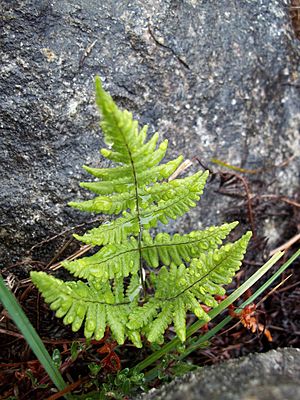Limestone fern facts for kids
Quick facts for kids Limestone fern |
|
|---|---|
 |
|
| Scientific classification | |
| Genus: |
Gymnocarpium
|
| Species: |
robertianum
|
| Synonyms | |
|
Dryopteris robertiana (Hoffm.) C. Chr. |
|
The limestone fern, also known as the scented oakfern, is a type of fern. Its scientific name is Gymnocarpium robertianum. This fern belongs to the Cystopteridaceae family. It is known for growing in places with lots of limestone.
Contents
What Does the Limestone Fern Look Like?
The limestone fern is a small plant, usually growing between 10 and 50 centimeters (about 4 to 20 inches) tall. It has special leaves called fronds. These fronds are shaped like a triangle and are divided into many smaller parts, often two or three times.
Fronds and Stems
The fronds grow from underground stems called rhizomes. These rhizomes creep along the ground. The fronds have a long, thin main stem called a rachis. This stem is often covered in tiny, sticky glands.
Spores and Reproduction
On the underside of the fronds, you can find small, round clusters. These clusters are called sori (plural of sorus). Sori contain the fern's spores, which are like tiny seeds that help the fern reproduce. Unlike some other ferns, the sori of the limestone fern do not have a protective cover called an indusium.
Where Does the Limestone Fern Live?
The limestone fern is found in many cool, northern parts of the world. This includes areas in Europe, North America, and the Caucasus Mountains. Because it grows in these widespread northern regions, it is called a "circumboreal" species.
Favorite Habitats
This fern loves places with lots of calcium in the soil. It is known as a "calcicole," which means it prefers alkaline (basic) soil. You can often find it growing in cracks in limestone pavements, especially in the British Isles. In places like Michigan, USA, it often grows in swamps where cedar trees are common.
Protection Status
Because of its specific habitat needs, the limestone fern is protected in some areas. For example, it is a protected species in Illinois and Michigan in the United States. It is also protected under the Flora Protection Order in Ireland. This helps to make sure this unique fern continues to thrive.
See also
 In Spanish: Gymnocarpium robertianum para niños
In Spanish: Gymnocarpium robertianum para niños

